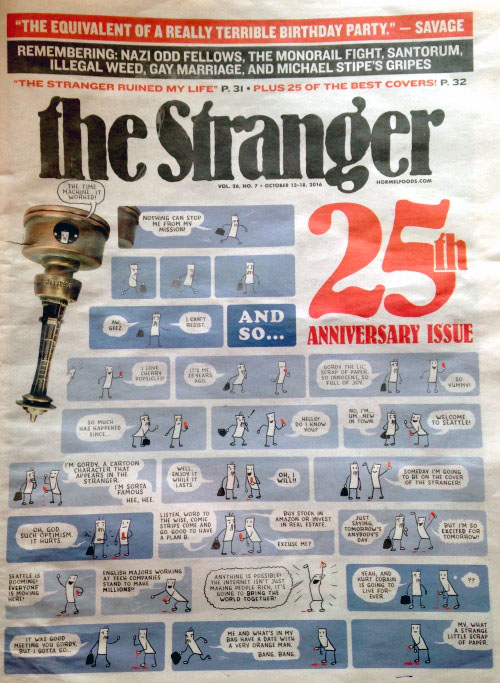We WiM editors feel fortunate to live in Seattle for many reasons, not least of which is our city being the home of alt weekly newspaper, The Stranger, which recently published its 25th Anniversary Issue. In the early 1990s, when The Stranger crashed onto the stage here in the Pacific Northwest, we were blown away by its brash, irreverent attitude, shaking up comfortable, complacent Seattle. While the publication’s tone was largely representative of the postmodern mindset that was hitting its peak in that era, we feel that – much of the time – the writers in The Strangeralso embodied a proto-metamodern way of accounting for life and its intricacies. (We say “proto-metamodern” to mean that, in hindsight, it appears both transitional to metamodernism, and kind of ahead of the wave, even though those involved were not thinking, “We’re metamodern!”)
The Stranger was not the local weekly arts and culture paper for the outdoorsy, fleece-wearing, REI crowd, who were already well supported in town by an established publication,The Seattle Weekly. The Stranger’s writing was in-your-face, fearless, irreverent, and took no prisoners. It was indeed postmodern-influenced, with its machete-like deconstruction of dogma and authority and unwarranted niceness. Yet the writers came across as way more personal, sometimes even vulnerable. The tone was as youthful and unconcerned – “Yeah, read this if you want… whatever…” – as it was socially conscious: “Hey, this shit’s important, so listen up, chump!”
It was also self-conscious, making fun of itself for purporting to be a “news” paper with opinions of any authority, while simultaneously taking the authority to opine— not just on local culture and politics but on more personal matters.
Many of The Stranger’s columnists, talking from a perspective that revealed, basically, what it’s like to be themselves, quite literally transformed how certain conversations can now be had publicly. For example: Dan Savage, a gay drag-queen advice columnist playfully shaming our ignorance, taught us oh so much about the vast array of sexualities and lifestyles all around us; Inga Muscio, with a fresh, bracing take on female social histories, reclaimed cunts – the word, the blood they shed, and the power of just being normal about such things; and The Psychic Guy, in his short-lived column, gently led us into the interior world of a normal dude with extraordinary psychic powers. The Stranger shifted the tenor of the national conversation around such previously taboo topics, the outcome being an ability to have much broader interchanges about human behaviors and attitudes than heretofore. (For the record, we loved The Psychic Guy, and bet he would be a hit today, now that the taboo against being a woo-woo kind of wacky has been somewhat lifted and people are more OK admitting that weird, unexplainable shit just happens. Hey Psychic Guy, if you’re out there, you can come write with us!)
The thing was, they didn’t trumpet any such mission. Never bigger than its britches, The Stranger was generally simply writing about Seattle, and its funky little café-sized culture of weirdos, miscreants and creative geniuses. Its influence nevertheless popularized not just a new way of writing about culture. It arguably influenced (or at very least mirrored and spread), the fiction writing style of the McSweeney’s crowd (Dave Eggers, et al.), where metamodernism really begins to find purchase, in the literary world, anyway. As we reflect back, it seems that, week by week, The Stranger readers were being trained to value the personal, the subjective, and the mightiness of small gestures toward being more real. To be as big or little as we were, just as ourselves. Not as someone else’s branding suggestion of what we should be striving to be—as a city, as individuals. To be stranger, if we wanna.
It was actually pretty profound. But you couldn’t get too new-agey or cosmic about how profound this was, because they would quash fetishization too. That’s how Zen/punk they were. They pretty much are. 25 years later.


